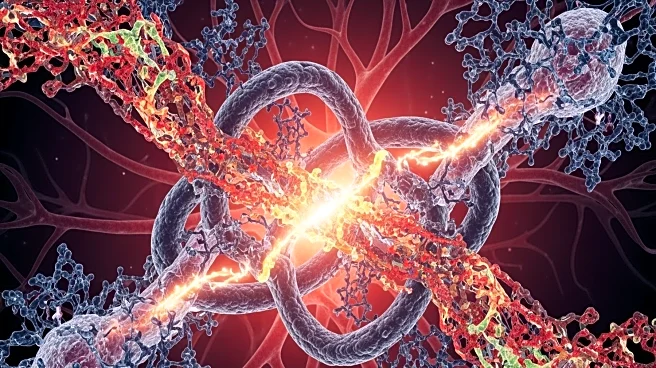What's Happening?
Recent research has identified the serine/threonine kinase STK32C as a significant factor in promoting angiogenesis in colorectal cancer (CRC). The study examined STK32C expression in CRC tissues and found a correlation with poor patient prognosis. In
vitro assays demonstrated that STK32C overexpression enhances endothelial cell proliferation, migration, and tube formation, which are critical processes in angiogenesis. The mechanism involves STK32C phosphorylating STAT3 at Thr196, which enhances its interaction with JAK2, thereby activating the IL-6/JAK2/STAT3 signaling pathway. In vivo experiments, including xenograft and Matrigel plug assays, confirmed that STK32C depletion leads to reduced tumor growth, decreased VEGF-A expression, and lower microvessel density, underscoring its role in tumor angiogenesis.
Why It's Important?
The findings highlight STK32C as a potential biomarker and therapeutic target in colorectal cancer treatment. Angiogenesis is a critical process in cancer progression, providing tumors with the necessary blood supply to grow and metastasize. By identifying STK32C's role in this process, new anti-angiogenic therapies could be developed, potentially improving outcomes for CRC patients. The study's implications extend to the broader field of cancer research, where targeting specific molecular pathways can lead to more effective and personalized treatment strategies. This research could pave the way for novel interventions that disrupt the angiogenic processes essential for tumor survival and growth.
What's Next?
Future research may focus on developing inhibitors that specifically target STK32C or its downstream signaling pathways. Clinical trials could be designed to test the efficacy of such inhibitors in reducing tumor angiogenesis and improving patient outcomes. Additionally, further studies might explore the role of STK32C in other cancer types, potentially broadening the scope of its therapeutic application. Researchers and pharmaceutical companies may collaborate to translate these findings into viable treatments, with the potential to significantly impact cancer therapy and patient survival rates.
Beyond the Headlines
The study also raises questions about the broader implications of targeting angiogenesis in cancer therapy. While inhibiting angiogenesis can starve tumors of nutrients, it may also lead to adaptive resistance mechanisms. Understanding these dynamics is crucial for developing comprehensive treatment strategies that combine angiogenesis inhibitors with other therapeutic modalities. Moreover, the ethical considerations of targeting specific molecular pathways in cancer treatment, such as potential off-target effects and patient selection criteria, will need to be addressed as research progresses.















